There isn’t enough awareness about vaginal health and hygiene, due to which women often take uninformed decisions that they’ll regret later.
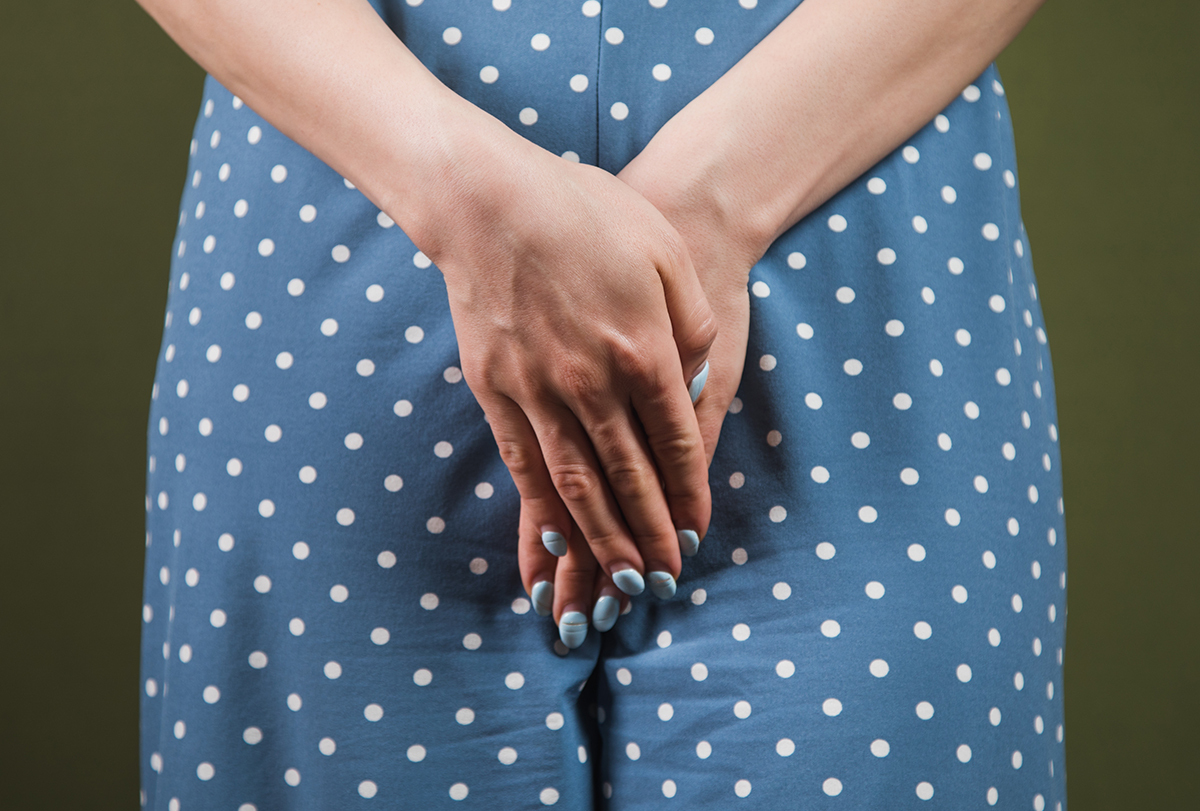
The vagina has an inherent mechanism to clean itself, so you don’t have to go all out trying to keep it clean. But most people don’t realize this and use a variety of products and techniques for vaginal hygiene that often lead to adverse side effects later. (1)
This article will take you through some common mistakes to avoid in order to keep your vagina in the best condition.
Things You Should Avoid Doing to Your Vagina
Here are a few don’ts for vaginal health:
1. Avoid vaginal douching
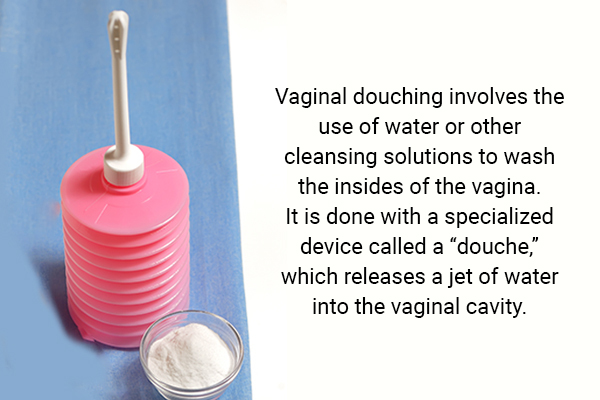
Vaginal douching involves the use of water or other cleansing solutions to wash the insides of the vagina. It is done with a specialized device called a “douche,” which releases a jet of water into the vaginal cavity. The force of the stream removes any impurities stuck on the inner walls of the vagina for a deep cleanse.
This form of vaginal irrigation is often promoted as a means to improve intimate hygiene, prevent or treat vaginal infections, and avoid pregnancy. But research has produced conflicting results regarding its efficacy and safety.
Doctors generally discourage this practice because it disturbs the natural vaginal pH, increases the risk of vaginal infections, and is associated with pelvic inflammatory disease, among other conditions. (2) So, douching can actually end up making your vaginal health worse instead of improving it.
The fact that the vagina is a self-cleaning organ makes douching all the more unnecessary given the risks involved. Just thoroughly wash your genital area with warm water from time to time to keep it clean. (3)
2. Say no to vaginal steaming
Vaginal steaming is an alternative technique to cleanse and tighten the vagina by exposing it to herb-infused steam. It is also known to ease menstrual discomfort, but there is absolutely no scientific evidence to back the purported benefits of this therapy. (4)
In vaginal steaming, a chair with a hole in its seat is placed over a pot containing steaming hot water. You have to sit in this chair without your underwear for about 20 minutes to up to an hour. A combination of medicinal herbs such as chamomile, wormwood, basil, and oregano are added to the water to release healing vapors that are supposed to be good for your vagina.
Vaginal steaming gained a lot of traction all over the world in 2015 when it was endorsed by the famous actress Gwyneth Paltrow, (5) but it has been largely discredited by scientists and gynecology experts.
The vagina is extremely delicate and exposing it to such heat can lead to burns. (6) Plus, it may disrupt the healthy vaginal flora and pH, thereby increasing the risk of infections, especially yeast infection. (1)
3. Stop wearing very tight underwear and do not wear tight skinny jeans all day
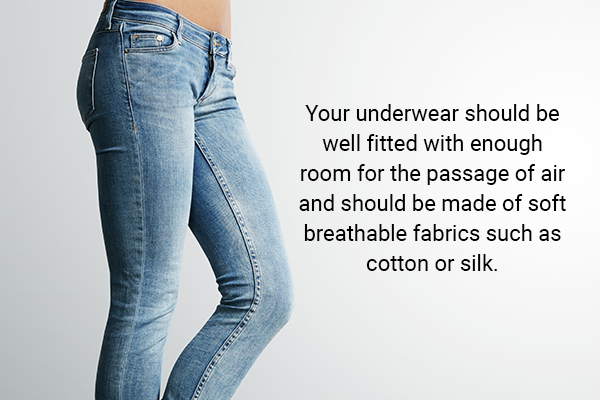
Your underwear should be well fitted with enough room for the passage of air and should be made of soft breathable fabrics such as cotton or silk. If it is so tight that it sticks to the skin, your genital area will collect a lot of sweat and friction, which will cause irritation and increase the risk of vaginal infections.
For the same reason, avoid wearing tights and skinny jeans for too long. Loose-fitting trousers or skirts are better options than denim, and stockings are preferable to tights. (7)
4. Please say no to piercing
About 0.8%–2% of women have had vaginal piercings and the number keeps growing, (8) but there are many reasons why you should steer clear of it.
The vagina contains a lot of nerve endings that make it quite sensitive. Puncturing this delicate area can lead to extreme long-lasting pain, which is aggravated during intercourse, as has been reported by several women. (8)
The skin may also take a long time to heal and develop a lot of scar tissue in the process. The enlarged scars can obstruct the opening of the urethra and make urination difficult.
Moreover, the piercing can cause serious vaginal infections that may even lead to infertility. Also, the use of contaminated tools, needles, and jewelry puts you at an increased risk of tetanus, HIV, and hepatitis B and C. (9)
5. Do not use scented perfumes/powder
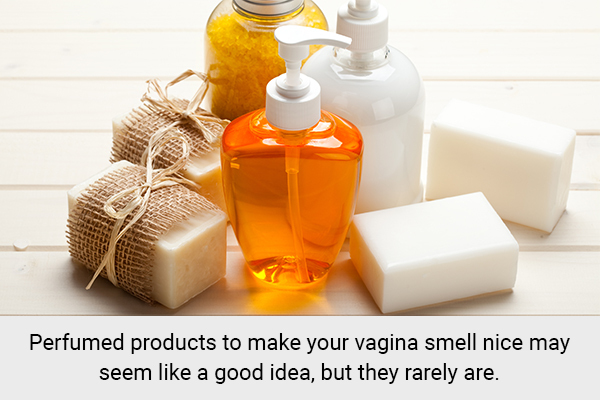
Perfumed products to make your vagina smell nice may seem like a good idea, but they rarely are.
They contain alcohol and other harsh chemicals that can dry out and irritate the sensitive skin of the vagina, resulting in redness, swelling, itching, pain, and even infection. Additionally, these formulations can disrupt the delicate bacterial balance of the vaginal flora, which can trigger infections. (10)
Go to your doctor for safer ways to get rid of vaginal odor.
6. Avoid getting a bikini/Brazilian/Hollywood wax in a low-rated salon
If you are thinking of getting your genital area waxed at a salon, make sure it meets the necessary safety and hygiene standards before booking an appointment. Do the research and choose the salon that offers the best facilities and services.
But you need to stay cautious during the process as well. Make sure they use clean fresh applicators as you don’t want residue from another session being transferred to your skin along with the germs from someone else’s body, which could result in an infection or something worse.
Plus, bear in mind that a hairless vagina has a higher risk of contracting infections and STDs as it readily absorbs germs. (11) The hair on the vagina protects the sensitive area from irritants and also soaks in moisture to keep the area nice and comfortable.
Keep all these things in mind when considering a bikini, Brazilian, or Hollywood wax. (1)(12)
7. Do not pop your pubic acne and do not scratch the area when it itches
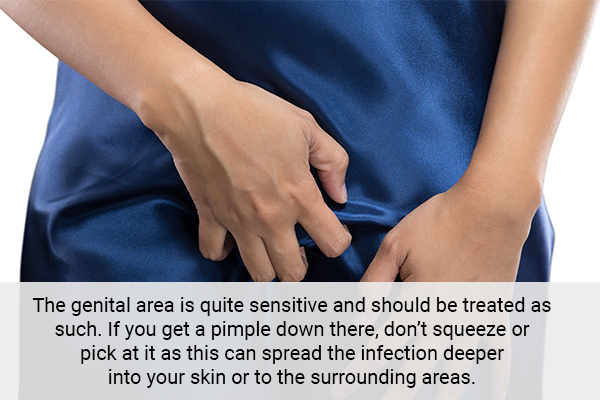
The genital area is quite sensitive and should be treated as such. If you get a pimple down there, don’t squeeze or pick at it as this can spread the infection deeper into your skin or to the surrounding areas.
The physical trauma can also aggravate the associated irritation and inflammation and damage the skin, which could result in scarring. The wise thing to do is to let the pimple heal on its own.
Similarly, scratching the vaginal area is a strict no-no as it only worsens the itch and damages the delicate skin in the process. Moreover, your nails and fingers carry a lot of germs that could transfer to the vagina and cause an infection.
Persistent vaginal itching may be a sign of inflammatory conditions such as psoriasis, contact dermatitis, and vulvovaginitis, wherein any contact with an irritant or allergen can lead to a flare-up. (13) Scratching the itch provides temporary relief but reinforces the itch with greater severity shortly after.
8. Do not put anything inside
Inserting fruits or vegetables in the vagina is a masturbatory technique used by some women, but the results can be disastrous and it’s not a risk worth taking.
No matter how thoroughly you have washed the natural produce, it may still have traces of germs, bugs, dirt, and pesticides that will get transferred to your vagina and inside your uterus to cause irritation, infection, and other serious medical problems. (7)
Plus, the product may have some sharp or rigged edges that can rupture the vaginal walls. Not just that, it may get stuck inside the vagina altogether.
In all these scenarios, it is important to seek prompt medical help rather than self-treating, which could make the condition worse.
9. Do not use pads/tampons for too long
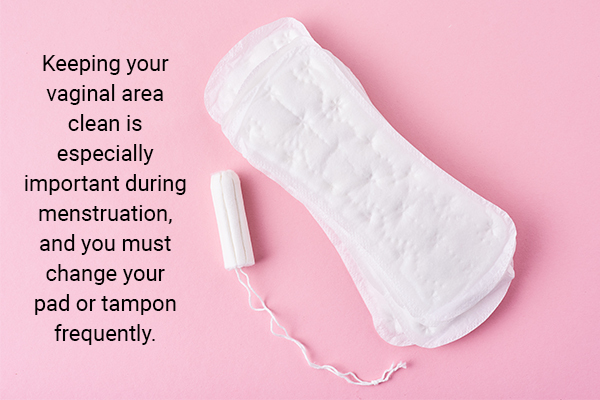
Keeping your vaginal area clean is especially important during menstruation, and you must change your pad or tampon frequently.
A healthy vagina has a neutral pH that ranges between 3.8 and 5, but menstrual blood is much more basic with a pH of 7.4. Wearing the same tampon or pad for prolonged periods can throw off the natural vaginal pH and pave the way for infections. (7) This is why many women often get vaginal infections during menstruation.
Some of these bacterial vaginal infections can cause life-threatening complications such as toxic shock syndrome if not treated properly.
Thus, it is very important to raise awareness about the need for menstrual hygiene through comprehensive policy building and social media campaigns so that the message reaches the very grassroots. (14)
10. Stay away from harsh vaginal lubricants
Vaginal lubricants make penetration during intercourse easier, but they have their drawbacks as well. They may be toxic to sperms and inhibit fertilization, reducing your chances of conceiving. (15)
Also, many of them contain harmful chemicals including parabens and propylene glycol that are used as preservatives to make the product last longer. But these chemicals can irritate the vagina and disrupt its natural pH and bacterial balance, causing infections and other problems. (15) A lot of people use petroleum jelly as a vaginal lubricant, only to regret it later.
Water-based lubricants are runny and slippery, but petroleum jelly is thick, viscous, and sticky and obstructs the smooth movement of the penis inside the vagina. It may stick to the latex condom and cause it to tear in the middle of intercourse. It only gets stickier and messier over time, which makes it a hassle to clean it up after sex.
If you must use a lubricant, ask your doctor to recommend the most suitable option for you.
Final Word
Maintaining vaginal health and hygiene is quite an easy task. All you need to do is to wash the area with warm water now and again, eat healthily, meet your fluid intake, exercise regularly, practice stress management, and wear breathable fabrics to keep the skin ventilated for a clean, healthy vagina. (7)
- Was this article helpful?
- YES, THANKS!NOT REALLY


